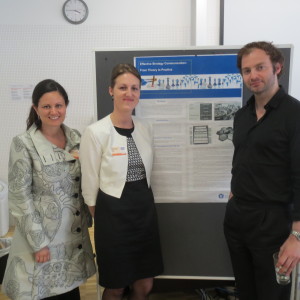Cross-Cultural Business Conference 2014
 Three papers of LBS researchers were accepted at the Cross-Cultural Business Conference 2014 at the University of Applied Sciences Upper Austria (Fachhochschule Oberösterreich). This international encounter of applied researchers and industry practitioners takes place in the city of Steyr, Upper Austria from 11-14 May 2014.
Three papers of LBS researchers were accepted at the Cross-Cultural Business Conference 2014 at the University of Applied Sciences Upper Austria (Fachhochschule Oberösterreich). This international encounter of applied researchers and industry practitioners takes place in the city of Steyr, Upper Austria from 11-14 May 2014.
Conflict management in a lingua franca setting
David Warren (Lauder Business School)
Elisabeth Kuebler (Stadt Wien Kompetenzteam (Lehre) für Bildungsmobilität und Diversität – Mobiliversity Project, Lauder Business School)
This paper addresses two questions: (1) how students talk conflict in an English as a lingua franca (ELF) environment when being confronted with (unfounded) accusations relating to their studies and classroom behavior; and (2) how, if at all, being at an international business school – and operating in English – changes ways of dealing with conflict. Drawing on current ELF and conflict communication literature, the communication strategies in the illocutionary (i.e. written), discourse (i.e. topic) and stylistic domains used in successfully managing conflict among speakers of various linguistic and cultural boundaries are analyzed. The responses to accusatory emails drafted by bachelor students (of a highly international business school) are examined by means of qualitative content analysis. The findings suggest that a student’s ability to talk conflict seems to increase with the years of exposure to Business English classes and to an international environment. However, irrespective of years of learning the majority of students prefer conflict management through stylistic devices rather than discourse (topic) ones. The study at hand points to recommendations for implementation in higher education and several useful junctures for further research (e.g. empirical testing of larger populations in longitudinal designs).
The New to Vienna Glossary: fostering a culture of welcome at a Viennese Institution of Higher Education
Elisabeth Kuebler, Roksela Miha, Martin Samek (Stadt Wien Kompetenzteam (Lehre) für Bildungsmobilität und Diversität – Mobiliversity Project, Lauder Business School)
International incoming mobility at institutions of tertiary education and likewise highly skilled migration prompted thought and action for a culture of welcome, thanks to which internationals feel supported and recognized by the host institutions. In the pre-arrival and arrival stages language barriers and especially bureaucracy appear to be the most difficult obstacles for successful integration. Frequently addressing these challenges from research and management perspectives, Lauder Business School developed a bureaucratese glossary (German, English, short explanation) for its fresher students. The paper at hand recounts the unfolding of the glossary and provides some future outlook. Thereafter, the authors discuss benefits and trade-offs in five areas, namely proximity to student’s reality, comprehensibility, scope and limits of norming, the relationship between institution and student, and incorporating user interaction. Drawing on notions of a culture of welcome, it can be concluded that a cautiously proscriptive approach (service orientation) should interact with a clearly more user-driven online tool (recognition aspect). It moreover distinguishes between short- and long-term transaction costs of support for successful student integration.
Effective Strategy Communication: From Theory to Practice
Sandra Pauser (IML 2011 graduate; now University of Vienna)
Nowadays many companies face the difficulty of communicating their strategy throughout the business in an effective way, by claiming that employees do not understand the strategy, even though different communication channels, such as personal communication, infoscreen- and intranet-messages etc., are used. In addition, languages and different cultural settings can cause difficulties when communicating the business strategy to employees. Several studies confirm that many companies exist where only a small amount of the workforce knows/understands the strategy of the company they are working for. This is not only true for small or medium sized companies, but also for companies that are listed on the FTSE 100. Consequently, the aim of this research paper is to find out in which way the strategy of an organisation should be communicated effectively to employees to assure on the one hand that the message is received and understood, and on the other hand is transformed into applicable knowledge and finally put into practice.
The conference papers were published in Fachhochschule Oberösterreich – Steyr (2014). Cross-Cultural Business Conference. Proceedings. Steyr, 193-204/243-265.


Recent Comments